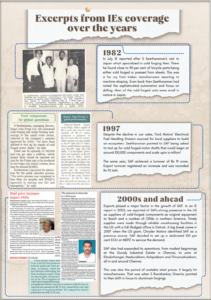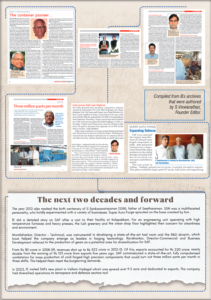A Golden Forge
For the fiscal year, SAF registered a revenue of Rs1600 crore and Seetharaman detailed on their ambitious expansion plans, “Currently we have around 70 per cent capacity utilisation. Over the next four years, we will invest about Rs 500 crore, averaging to Rs 125 crore annually. This would go into buying new machinery, factory spaces and advanced technological upgrades.”
Our components are EV compatible
Currently, SAF is majorly export oriented with about 81 per cent of their products reaching international markets. Of this, around 70 per cent is directed towards the USA, while Europe and India account equally for the rest. Currently 95 per cent of the components produced are for the automotive industry and it includes drive shafts, braking and suspension parts. Only 5 per cent comprise of non-automotive parts. Seetharaman pointed that SAF was strategically expanding by focussing on forward integration. This includes heat and surface treatment of components and also offering sub-assemblies to customers.
In the automotive space, transition to EVs poses a threat to auto component manufacturers as the percentage of mechanical parts is less in these vehicles. But Seetharaman presented a confident outlook for SAF as the impact of EVs majorly affected the two and three-wheeler segments and not their customers who are into four-wheelers and other vehicle types. “Our product range will remain largely relevant and all our components are compatible with EV requirements too,” he pointed and continued, “we expect that before EV, alternative technologies like hydrogen and other hybrid vehicles will have a more pronounced impact.”
Rs 75 crore expansion at Periamadurappakam
To strengthen presence in domestic markets, SAF is exploring opportunities within the defence sector, aligning with India’s push for increased local manufacturing. To meet the growing demands of domestic and international markets, the company is expanding its Periamadurappakam facility at an investment of Rs 75 crore. Spread over 24 acres, the unit will manufacture heavy aluminium components and is expected to be operational by September 2024.
Currently about 70 per cent on the energy requirements are met through renewable energy of which 19 MW is from wind and 22 MW is from solar. “Our goal is to achieve self-sufficiency in energy within the next two to three years,” said Seetharaman and this would position SAF as a leader in sustainable manufacturing.
Inducting more women to workforce
The dynamic nature of automotive industry involves a constant change in quality requirements and product capabilities, Seetharaman feels that there is a continual need to adapt to evolving customer needs and this would require for investment in new production and testing equipment to keep pace.
Apart from this quality manpower has also been a persistent challenge. But SAF ensures to pick, train and retain them. Currently SAF has about 1800 employees and of this 500 are women. “Our goal is to increase this to 35 per cent by the end of next year, aiming for around 700 women employees. This includes women working on the shop floor and operating machinery,” highlighted Seetharaman.
Five years down the line, SAF aims to grow to a Rs 3000 crore organisation with completely professionalised management. “There are no challenges in achieving this. It is purely related to timing and continued strategic execution,” said Seetharaman.
Forging a Golden Legacy…
Conventional presses that were used back then worked on the principle of removing material to get a shape. The process involved high raw material wastage, low production rate and huge number of final parts that were non-conforming to client requirements. That was when the economy and elegance of cold forging attracted Seetharaman and Super Auto Forge emerged as the pioneers of warm and cold forged components. Cold forging enables a 50 percent reduction in raw material usage, achieves production rates five times higher than traditional presses, and delivers superior quality with smooth, finished parts, all while consuming significantly less power. A visit in 1982 to Japan further sealed Seetharaman’s confidence in the technology as he saw several small scale units using cold forging to produce millions of parts, even back then. Japan’s sophisticated automation, high productivity, quality and efficient man power were the pillars that SAF too focussed on. From a small unit in Ekkaduthhangal near Guindy, today SAF is spread across five units in Kolapakkam, Vallam, Nedukundram, Thirumudivakkam and Periyamadurapakkam, and have emerged leaders in cold and warm forged components.


